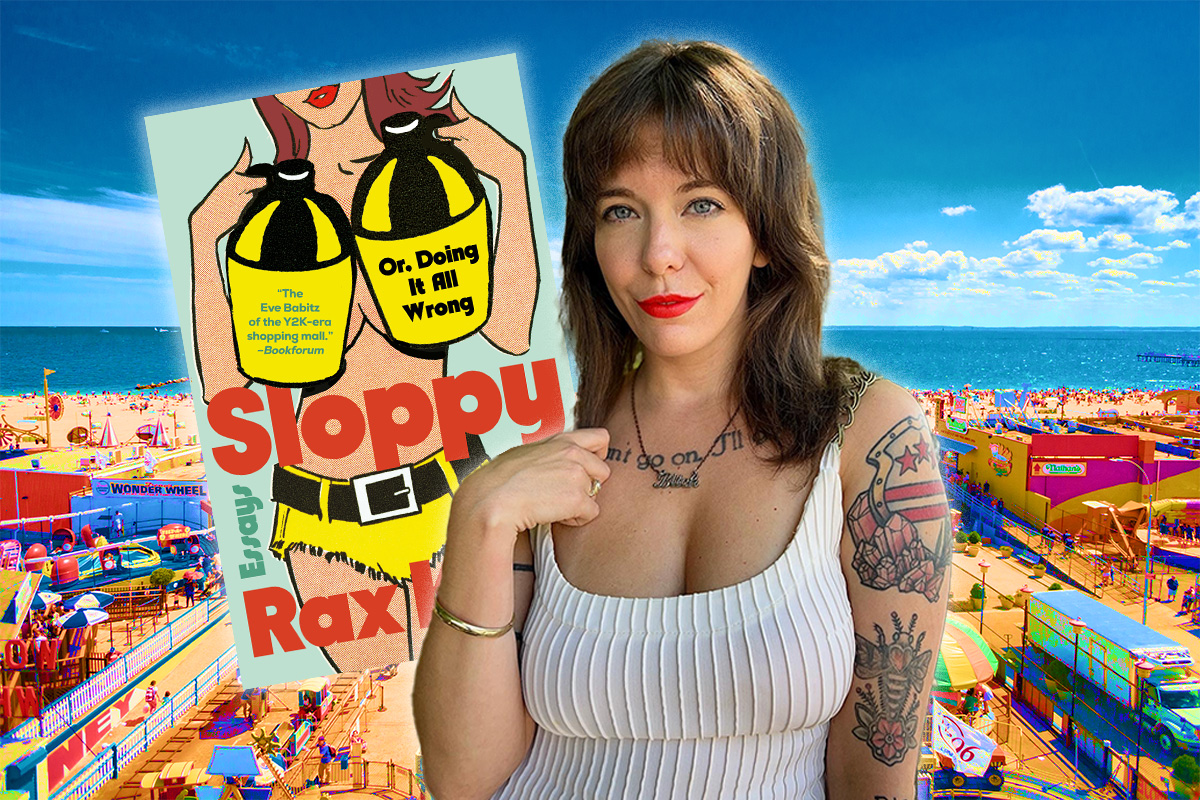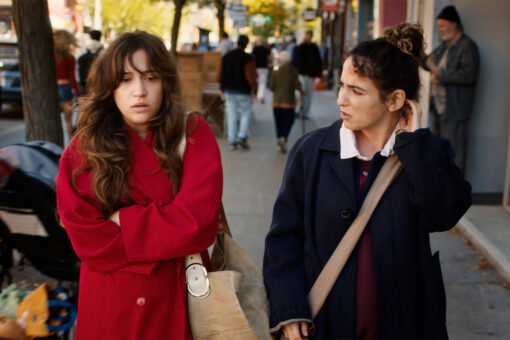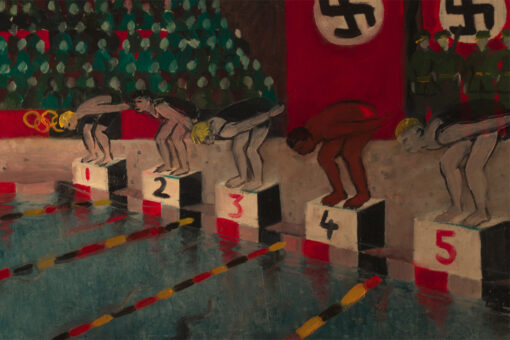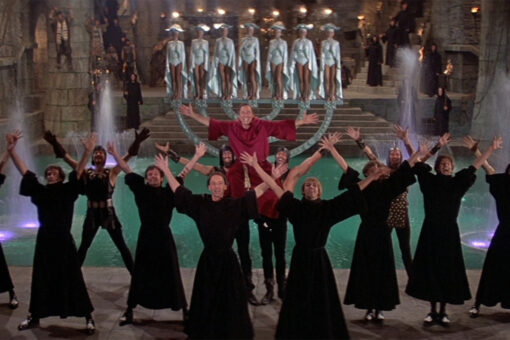I’m running late to meet Rax King. Like, really late.
It’s a sloppy move, to be a writer tardy to the interview you requested, at the Coney Island boardwalk, no less. But I don’t have the time to think about that at the moment. Instead of moseying south on the Q like I had planned, I’m forced to swallow my pride and call an Uber. To Nathan’s Famous Hot Dog stand, please.
When I finally arrive about 30 minutes after our scheduled meet time, Rax is standing in front of the closed gift shop directly next to Nathan’s. We’ve never met before, but I immediately know it’s her. She’s cooly looking down at her phone through heart-shaped sunglasses that match the redness of her lipstick, headphones around her neck like just another of her chokers. She’s wearing jean shorts with fishnets underneath and a t-shirt repping a different hot dog stand. One of her boots is pressed up against the storefront’s metal garage-style gate.
This is surely the author of “Sloppy.”
Rax first rose to prominence (or shall I lovingly say, power) after her essay “Love, Peace, and Taco Grease: How I Left My Abusive Husband and Found Guy Fieri” broke through the literary world for its bare honesty and emotional faculty. Her debut essay collection “Tacky” soon followed in 2021, revealing Rax’s trademark sharp and perceptive humor and invigorating love of all things uncouth. She’s the kind of writer who analyzes “The Jersey Shore,” The Cheesecake Factory, Bath & Body Works Warm Vanilla Sugar fragrance and, of course, Guy Fieri alongside intellectual powerhouses. Her writing is vivid to bursting point. There’s a feeling of balletic ease with which she maneuvers the reader. And there are absolutely no frills.
“Sloppy: Or, Doing It All Wrong,” which came out yesterday, is a delicious addition to this oeuvre. In these 17 new essays, Rax wades into her own worst habits, bad behavior and general sloppiness. She covers her penchant for lying and alcoholism, shoplifting from Brandy Melville, navigating the social hierarchy of Neopets as a child and her self-described “piss-poor” job of attempting suicide during her first marriage. All of her essays are achieved through an attentive, deeply dark wit borne of — what else? Jewish tradition.
At Coney Island, Rax easily forgives my own sloppiness. She orders a chili dog, no onions, and a small lemonade, and I parrot her order in deference. (Unsurprisingly, it’s great.) The day is uncharacteristically gray for early July, but the boardwalk is still thrumming with people. We snag the only available seats, a picnic bench shared with an equally gray photographer. We chat about how sad we’ll be when Mel Brooks dies, compare Neopets’ Neopia and Anatevka from “Fiddler on the Roof” and our fear of saying incriminating things online. You know, small talk. We house our chili dogs and soon crumpled napkins, hot dog boats and my recording iPhone share the space between us. It’s time to get down to business — or at least, business such as it is when the business at hand is all things sloppy.
In the following conversation, recorded as seagulls treaded air overhead and the mechanical tunes and screams of Luna Park played behind us, Rax and I discuss old Jewish dads, her worst Jewish habit and and a personal plea to Jordan Belfort.
The following conversation is lightly edited and condensed.
OK, so we were talking about middle school. Did you have a bat mitzvah?
No, no. I asked my dad once – I had just learned about Reform versus Conservative versus Orthodox. I was like, Daddy, which one are we? And he laughed, and he was like, I don’t know, gentile? The fourth one. Being Jewish was much more about Mel Brooks movies and being loud and funny at dinner, the more ethnic and cultural side of things.
For sure. Mel Brooks was so huge for me as a kid. My dad introduced my sister and I to him and Carl Reiner’s stand-up routines, and we’d just repeat the punchlines to each other all day long.
And not entirely understanding why it was so funny, or why the people in the studio audience were laughing like crazy. But that’s kind of how I talk, right, these same speech rhythms and the manner of joking, being very wry.
So what does “sloppy” mean to you?
I mean where the word comes from, as my book title, is I had a hard time in school academically. And the reason for it, as my teachers would write on all my tests and papers, was that I was sloppy. I could never find my work because I didn’t organize my binder. It was just loose, crumpled up papers in my backpack, and never the one I needed. I did everything that way. And the word stuck. That specific word wound up sticking and informing my approach to all kinds of stuff other than school. I was a sloppy drunk, for sure. I was a sloppy friend. Anything that a person could do, I pretty much did poorly.
Did it feel natural after “Tacky” to write “Sloppy”? Did you already have in your mind that you wanted to do that?
No, I’ve been working on a novel as well. I thought that that would be my next move after “Tacky.” I thought, do “Tacky,” and then do the novel. I wound up getting sidetracked because I quit drinking in 2022 and immediately started writing about it and about how I really didn’t have the excuse anymore of “well, I’m a slob because I’m drunk all the time, and isn’t that cute and funny of me?” I had to really find a new approach to just about everything. So I got sidetracked into writing an essay collection about having to figure out how to be a person without my usual habits and crutches.
Do you think you achieved that?
Yeah, I’m fixed now. I wrote the book and now I’m normal. No, it’s been weird, actually. In the book, most of it was written two to three years ago at this point. So a lot of what I say about sobriety and bad habits in “Sloppy,” my views on it have changed. I have a different approach to a lot of the stuff that I write about just because of the passing of time. I stand by what I wrote, but it’s interesting to go back and reread stuff that’s being excerpted in other publications and be like, I do that so differently now.
Do any specific examples of that come to mind?
In the book I talk at some length about how I don’t go to 12-Step meetings and I do now. And so that alone, there have been so many changes to my life downstream because of that.
In “Proud Alcoholic Stock,” you write about your party golem. How did you come up with that concept?
Yeah, it’s this feeling that I used to get. If you’re a drunk, you’re always hearing from other people about some offensive shit you did. For me, one of those anecdotes is that I stabbed a friend of mine in the leg with a pencil. He wound up having to take antibiotics. It wasn’t that bad, but it wasn’t an OK thing to be doing to people. And it wasn’t something I would have done sober. I’d never stab people with pencils. And there was a lot of that stuff in the years that I was drinking and drugging. It was all kinds of stuff that I would hurt someone and hear about it later and not be able to remember doing it at all.
And so you end up in your head divvying up your personalities between sober, functional daytime me or whatever. It might not even be daytime, but this sober version of me that writes the checks and goes to work. And then this creation of mine that I am in charge of. Technically, I made her, but she does stuff that I wouldn’t do, that I don’t think of myself as doing. There’s this distinct tendency to separate. And for me, the form of separation that made most sense was, this is me and this is my golem.
I so appreciate that at the end of the essay, the party golem still exists. She’s not a malevolent force. She’s just present, and that’s what it is.
That’s basically where I’ve landed with it. Because another thing about quitting drinking is, I joked about this earlier, but I really did think it was gonna fix me. I thought it was gonna solve all my problems. And of course, that’s not the case. This creation that I had been thinking of as my party golem is just me. She’s still in there and still very expressive. I can’t eliminate her. I gotta figure out how to work with her.
Is “truth” sprawled on her forehead?
For my party golem, it would be something more like lies.
Fair. Do you still shoplift from Brandy Melville?
So this question keeps coming up, and I’ve been answering it honestly. Yes. When I go there, I do still shoplift. I feel like I’ve got to start lying about it, though, because these things are going to be said about me publicly. They’re going to have a picture of me in Brandy Melville corporate headquarters.
Every store will be on the watch for you.
And I’m pretty identifiable. The only thing I have going for me as a shoplifter in there is that I’m older than everyone else. I think the people working there think of me as too responsible and settled to be stuffing tank tops into my purse and whatnot. But I’m not.
Right. But also Brandy Melville had that whole Nazi scandal a few years ago. So it’s like, the least they can do is let you shoplift.
Yeah, the other thing I tell myself is that the people in charge of that operation are so gross and messed up. So I would gladly stick it to those people. I’ll stick it to them for the rest of my life if I have to.
I also loved your essay about old dads. Why do you think being an old dad is co-morbid with being Jewish?
I will contextualize this. So in this essay, I talk about having an old dad. My dad was 47 when he had me, which isn’t old old. But in the ’90s, especially, that’s an age that most people aren’t becoming dads for the first time. He was always older than all my friends’ dads, and he was also old in this specific sickly, complaining kind of way – which I have very much inherited. I am just a sickly griper. That’s my lot in life. And so in that essay, I talk about that type of personality: being prone to depression, being kind of scattered, being charismatic and funny, but also deeply unhappy. I call that the “old dad personality,” and it’s something I definitely associate with the Jewish people I’ve been close to, family and close friends. We are, broadly speaking, kind of a sickly bunch, whether in reality or because we’re just on high alert for it. And not shy about complaining about stuff.
Also, I’ll say, most of the Jewish people I’ve known who do have that stereotypical kind of griping personality, aren’t whining. They’re being funny. The way we converse is by airing grievances one after the other in this sort of jokey, riffing way. And I wanted to really explore that and look at what being sickly and complaining and kvetching, if you will, looks like when it’s divorced from just the stereotypical nebbish.
What’s your favorite thing to complain about?
That’s a hard question. On my podcast, we literally have a segment called “The Gripe Zone” where each person goes around and shares a petty gripe. I prefer a petty gripe to a serious gripe. There’s more room to be funny with a petty gripe.
It seems like your dad was really funny.
He was the funniest guy I ever met in my life, to this day.
You write so much about your dad in “Sloppy” and “Tacky.” Are there things about your dad that you’ll keep for yourself?
I can’t say for the entire future. But as it stands now, absolutely there are. As a memoir writer, and as a fairly confessional-seeming memoir writer, I write about things that a lot of people would be ashamed to admit they had done. And then they tell me sometimes, in this way I find very embarrassing, like, “Wow, you’re so brave for being willing to write about that.” But for me, the things I write about are not the shameful things. Writing about years of drug addiction and strange sexual choices, that stuff is not embarrassing for me. It’s not a secret. But it leads people to think that I must have no secrets. Of course I have secrets. I keep secrets of my own, and I keep some on behalf of my family. So I think that’s probably going to change, as it does for everyone who writes about themselves. You change. You move the goal posts of what you feel comfortable saying and what you don’t.
I think of the meme where it’s like, we need to know less about each other. Our culture is in this mode of sharing everything, specifically online. And I think there’s a confusion of like, sharing everything with being brave or vulnerable. But I think it’s more vulnerable to pick what parts of yourself you’re choosing to share.
Theoretically, that’s exactly what I’m doing. I’m picking certain parts of myself to shine a spotlight on for an audience. The idea eats me up that the things I am choosing to spotlight are boring or repellent or whatever. That’s what scares me. It’s not the idea that people are gonna learn all my secrets and never put the toothpaste back in the tube or whatever. It’s the idea that I’m gonna say some stuff I think is fun and funny and edifying, I hope, and people are just gonna be like, fuck you. That was terrible.
I can say I don’t think that’s the case with “Sloppy.”
Thank you. How funny would it be if you were like, this is such an awkward moment to have to tell you how terrible your book is.
How was the writing process compared to “Tacky”?
So my writing process with “Tacky” and with most of what I had written for hire, up until then, too, is I would hole up in private somewhere with an eight ball and some whiskey. I feel like this sounds like I’m trying to sound cool. This was deeply depressing, just hunched over my little pile of cocaine in a shitty motel room in front of my laptop. I would do a bunch of blow, then I would drink a bunch of whiskey, and then I’d be like, “It’s time for the magic to happen.” I got some stuff down that was good. I thought of it as, this is the combination of mind-altering stuff that I require in order to produce good writing, ignoring just how much downright dog shit writing I produce this way. But that was “Tacky.” It was very much written in that mode, almost completely.
With “Sloppy,” that wasn’t an option. I’m writing about all the stuff I’ve given up. I can’t do that with a nose full of cocaine. And so I had to come back into a writing practice that didn’t center around obliterating my mental capacities first. That felt vulnerable. It took me a long time after quitting drinking to start thinking creatively. That’s part of why I wrote so much in those first days about quitting drinking. It was the only thing I could think about, constantly. And that did change. There’s certainly essays in the book that aren’t explicitly about drinking and addiction. I got there, but it was really hard to write about anything except quitting drinking and it was really hard to write about it through any lens other than I am so bored and miserable and I want to die, and I want to take everybody down with me.
Do you have a favorite essay in the collection?
Maybe “Domesticating ‘The Wolf of Wall Street.’” I used to really hate that movie. Actually, I remember I watched it for the first time with my dad. In retrospect, I was obviously feeling so called out by this movie. All the druggie behavior was stuff that I was guilty of — you know, the poor person version. But I felt so disgusted by Jordan Belfort, the protagonist. I felt disgusted by everything he was doing and I was like, I don’t want to watch a movie about that. And then I quit drinking and drugging and I was ravenous for watching movies about that stuff. I watched it and it became clear to me that for all the talk about how this movie glamorizes addiction and glamorizes crime, I watched it and I thought, that’s really not the case. This is a movie about how boring and stupid and pointless your life becomes when all you can think about is scumbag shit. I think that’s the essay in that collection I’m probably the most proud of.
I actually tried to get Jordan Belfort to give me quotes for it. I wrote to every email address I could dig up. I wrote to about three different publicists trying to get a hold of him. And they, very wisely, were like, Absolutely not. I never got an email back from anybody associated with the Wolf of Wall Street. But if you read Hey Alma, Jewish man, then, maybe do your bit for poor people who have been addicted to the same shit you were.
Hard pivot, but I read in a profile a few years ago, you said you were learning Yiddish. Are you still learning?
I am. I’ll plug those Zoom classes that my teacher Eve leads at The Workers Circle. Eve is the best. She’s the sweetest, coolest lady, and I’ve been taking those classes for a few years now. It’s at the point where, I live in a neighborhood that abuts Hasidic Brooklyn, and I can eavesdrop. It’s great.
Wait, in that profile I read you said your dad learned Yiddish so he could eavesdrop on his parents.
Yep, that’s why.
That’s such a beautiful full-circle moment.
It’s funny. In my Yiddish classes, whenever there’s a new term, in the first class, we will often be asked, “Why are you interested in learning Yiddish?” And so many people’s answer to that question is: My parents learned Yiddish so they could eavesdrop on their parents. It’s just this endless feedback loop of Jews trying to eavesdrop on each other.
So, what’s your next project after “Sloppy”?
I’m still working on that novel. This time I’m really going to sell it. That’s definitely my big writing project for the moment. And I’m also teaching memoir workshops at Sackett Street Writers.
Can you say a little bit about what the novel is about?
I could, but I won’t.
Totally fair. Last question: what is your most Jewish or Jewish-coded bad habit?
I’m gonna give a left field answer to this. I’m gonna say smoking weed. I don’t know if you share this experience, but the biggest potheads I have ever known have been Jewish people. My dad included among them. His friends used to tell all these stories about trying to go into his office and the door would be locked, and there’d be smoke pouring out from the bottom. I come by it honestly, and I am trying to give it up. But for the moment, my most Jewish bad habit is smoking fat doinks.



